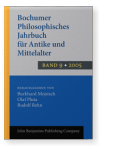Die Opposition des Johannes de Polliaco gegen die Schule der Gandavistae
In spite of the fact that Henry of Gent (†1293) had a major and lasting influence on the developments at the University of Paris after the condemnation of the errores philosophorum in 1277, the Gandavistae – pupils of Henry of Gent – are hardly known by their proper names in the history of philosophy. As a member of the theological and philosophical faculty, Henry broke with the predominant Averroistic approach to Aristotle’s conception of science and concentrated, instead, on the Aristotelian tradition. He defended a revised version of the Aristotelian doctrine of the categories along the lines of the pseudo-Boethian Liber de sex principiis and ascribed fundamental eminence to relatio, a category which was considered ontologically “debilissimus” among the Aristotelians. John de Polliaco († p. 1321) was a pupil of Albert the Great, Thomas Aquinas, Henry of Gent and Godfrey of Fontaines during the seventies of the 13th century. In his Quodlibet I, q. 7, dating from 1307, he gave a controversial account of the notion of relation that was favoured by Henry’s adherents: “Does the relation, expressed as a (modal) respect, differ from the respects (respectus) expressed by the six principles?” In this discussion he attacks the intentional and modal interpretation given by the Gandavistae and calls them non-reales. Is this accusation already an indication of the rise of 14th century nominalism?
Article language: German
Cited by (1)
Cited by one other publication
Pasnau, Robert
2009.
The Cambridge History of Medieval Philosophy,

This list is based on CrossRef data as of 1 july 2024. Please note that it may not be complete. Sources presented here have been supplied by the respective publishers.
Any errors therein should be reported to them.
